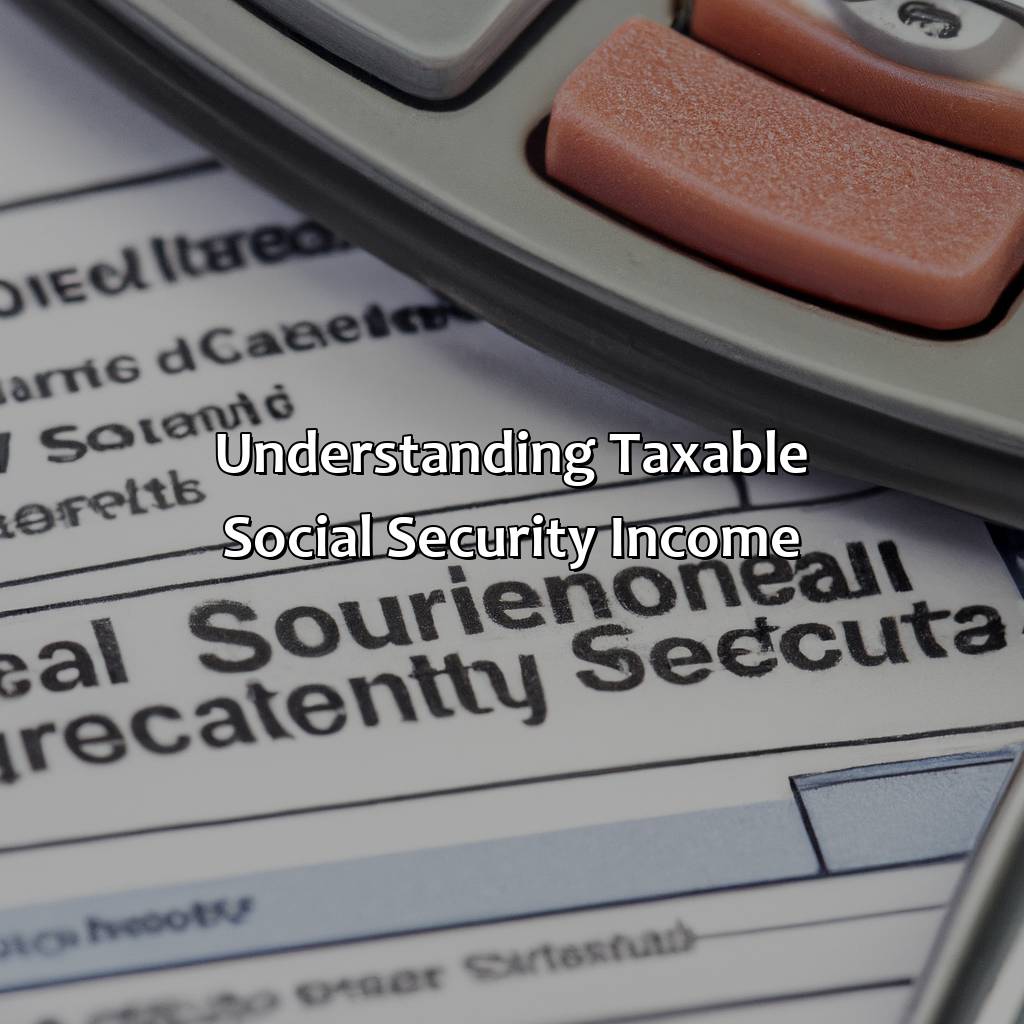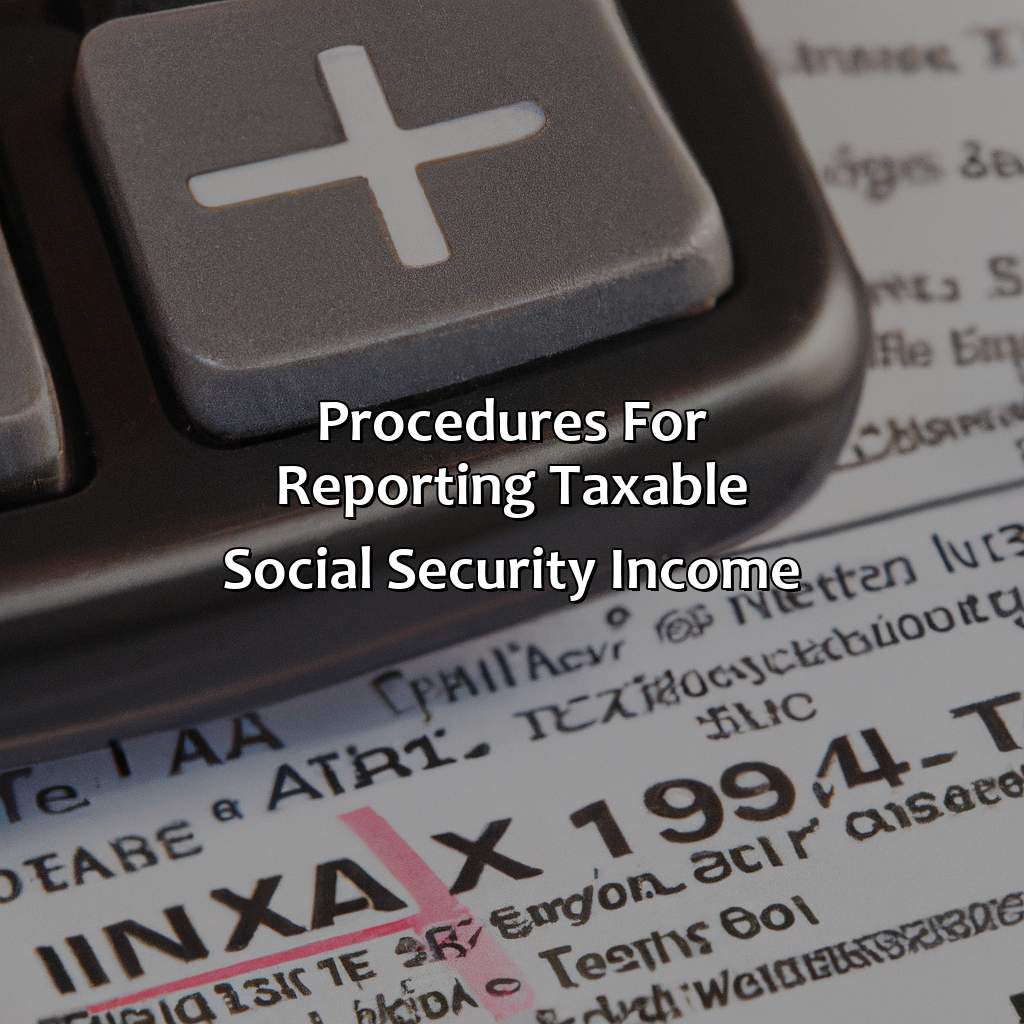How Do I Calculate How Much Of My Social Security Is Taxable?
Key Takeaway:
- Understanding taxable social security income: Not all Social Security benefits are taxable, so it is important to know the types of benefits that are taxable and those that are not.
- Steps to calculate taxable social security income: The provisional income of the taxpayer determines the portion of the Social Security benefits that are taxable. To calculate provisional income, all sources of income must be considered.
- Procedures for reporting taxable social security income: Filing income tax returns and paying taxes on Social Security benefits are two important procedures for reporting taxable Social Security income. Make sure to consult with a tax professional for any questions or assistance.
You may be wondering how to figure out how much of your Social Security is taxable. With the recent changes to the taxation on Social Security income, it’s important to understand your tax liability and how to calculate it. This article will provide step-by-step instructions to help you calculate your Social Security taxable amount.
Understanding taxable social security income
Understanding the Taxable Portion of Your Social Security Benefits
If you receive social security benefits, you may have to pay taxes on a portion of your income. The amount of your benefits that are taxable depends on your income and filing status. Generally, the more income you have, the more you’ll owe in taxes on your benefits. You can use the IRS worksheet or a tax software program to calculate the taxable portion of your benefits accurately.
To calculate the taxable portion of your social security benefits, you need to know your combined income, which includes not only your social security benefits but also your taxable pensions, wages, interest, dividends, and other taxable income. If your combined income exceeds a certain threshold, you’ll owe taxes on up to 85% of your social security benefits.
It’s essential to file your tax return accurately and on time to avoid penalties and interest charges. Also, it’s a good idea to consult a tax professional if you have any questions or concerns about your tax obligations.
Pro Tip: Understanding the taxable portion of your social security benefits can help you plan your retirement income more effectively and avoid unexpected tax bills. Keep accurate records of your income and expenses to help you file your tax return accurately.

Image credits: retiregenz.com by Harry Woodhock
Steps to calculate taxable social security income
Work out taxable Social Security income? You gotta know your provisional income first. That’s your adjusted gross income plus non-taxable interest income. Plus half of your Social Security benefits. Work out your provisional income, then you can figure out the taxable bit of your Social Security benefits. This requires a formula based on your filing status and provisional income.

Image credits: retiregenz.com by David Washington
Identifying provisional income
To determine the taxable social security income, you must first identify your provisional income. This includes all sources of income such as wages, dividends, and pension, plus any tax-free interest and half of your Social Security benefits.
Furthermore, if your provisional income exceeds the base amount of $25,000 for individuals or $32,000 for married filing jointly, up to 85% of your Social Security benefits may be subject to taxation. Calculating taxable social security income is crucial in determining one’s tax liability.
It’s worth mentioning that the base amount is not adjusted for inflation and remains constant year-over-year.
According to the IRS website, “Up to 50% of Social Security benefits are subject to taxation when provisional income exceeds $25,000 for single filers and $32,000 for joint filers. An additional 35% (up to an 85% total) applies when provisional income tops beyond these amounts.”
Why do they call it ‘social security’ when calculating the taxable portion feels more like a social experiment?
Calculating taxable portion of social security benefits
Calculating the taxable portion of your social security benefits is important in determining how much of your benefits are subject to federal income tax. To do so, you need to consider your provisional income, which is the sum of one-half of your social security benefits, your adjusted gross income, and any tax-exempt interest you may have. Using this information, you can determine whether a portion or all of your benefits are taxable.
| Provisional Income Level | Percentage of Benefits Subject to Tax |
|---|---|
| Below $25,000 for single filers and below $32,000 for joint filers | 0% |
| $25,000-$34,000 for single filers and $32,000-$44,000 for joint filers | Up to 50% |
| Above $34,000 for single filers and above $44,000 for joint filers | Up to 85% |
It’s important to note that up to 85% of your social security benefits can be subject to federal income tax if you fall within a higher income bracket. Additionally, state taxes may also apply depending on where you live. Conducting proper calculations can help ensure that you don’t face unexpected taxes and penalties.
Take control over your finances now by calculating how much of your social security income is taxable. Don’t let the fear of missing out on potential savings and financial stability hold you back from making informed decisions about taxes.
Get ready to report your taxable social security income – the IRS is more excited about it than you are.
Procedures for reporting taxable social security income
You need to take certain steps to report your taxable social security income. This article will help you by discussing two solutions:
- Procedures for reporting taxable social security income
- Filing income tax returns
Plus, it will explain how to pay taxes on social security benefits.

Image credits: retiregenz.com by Yuval Jones
Filing income tax returns
Tax Responsibilities for Individuals – A Professional Guide
Filing income tax returns is a crucial part of our tax responsibilities. It involves reporting all sources of income and deductions made throughout the year. However, it can be confusing, especially for those with complex financial situations. To ensure you file accurately and on time, follow this six-step guide:
- Gather necessary documents such as W-2s, 1099s, and receipts
- Determine your filing status and find your standard deduction amount
- Calculate your total income
- Take deductions and credits into account
- Determine how much you owe or expect to receive as a refund
- Sign and submit your tax return by the deadline
It’s important to note that there are unique details depending on individual circumstances such as owning property or having additional sources of income from investment or self-service platforms.
A recent survey conducted showed that filing taxes online has become more popular than ever before, providing convenience and reducing delays common with mail-in options available.
In summary, ensure you meet all tax obligations by understanding filing requirements to avoid penalties or audit reviews from the IRS or relevant taxing authority in your jurisdiction.
Payment of taxes on social security benefits
It is essential to understand the proper reporting procedures for determining taxable social security income. The tax laws are complex and require careful consideration of one’s income and other factors. Reporting your social security benefits accurately can prevent any penalties or interest charges.
To calculate how much of your social security benefits are taxable, you need to determine your provisional income. This includes half of your social security benefits, other taxable income sources, plus any tax-exempt interest. If your total exceeds a certain amount, up to 85% of your social security benefits may be subject to taxation.
It is crucial to note that not everyone will have taxable social security income. Individuals with lower incomes may not need to pay any taxes on their benefits. Additionally, those whose only source of income is their social security benefits may also be exempt.
Assuming that you have taxable social security income but fail to report it correctly can lead to severe consequences. Inaccurate reporting could result in an IRS audit, which would require you to pay back taxes with penalties and interest on top of that. Therefore, it is vital that you follow the reporting procedures carefully and accurately when filing your taxes to avoid any issues in the future.
Five Facts About How To Calculate How Much of My Social Security is Taxable:
Up to 85% of your Social Security benefits can be taxable, depending on your income level. (Source: AARP)
To calculate how much of your Social Security is taxable, you need to add up your adjusted gross income, nontaxable interest, and half of your Social Security benefits. (Source: TurboTax)
If you file your taxes as an individual and your combined income (AGI plus half of Social Security benefits) is between $25,000 and $34,000, up to 50% of your benefits may be taxable. If your combined income is above $34,000, up to 85% of your benefits may be taxable. (Source: IRS)
If you file your taxes jointly with your spouse and your combined income is between $32,000 and $44,000, up to 50% of your benefits may be taxable. If your combined income is above $44,000, up to 85% of your benefits may be taxable. (Source: IRS)
If you receive Social Security disability benefits, the same rules apply for determining the taxable portion of your benefits. (Source: SSA)
FAQs about How Do I Calculate How Much Of My Social Security Is Taxable?
How do I calculate how much of my social security is taxable?
To calculate how much of your social security is taxable, follow these steps:
- Determine your provisional income
- Find your base amount
- Calculate your taxable social security benefits
Your provisional income is your total income, including half of your social security benefits and any tax-exempt income. Your base amount is $25,000 if you’re single or $32,000 if you’re married filing jointly. If your provisional income is below your base amount, none of your social security benefits are taxable. If your provisional income is above your base amount, then up to 85% of your social security benefits may be taxable.
What is provisional income?
Provisional income is your total income, including half of your social security benefits and any tax-exempt income. To calculate your provisional income, add up your adjusted gross income, tax-exempt interest income, and half of your social security benefits.
What is the base amount?
The base amount is the amount of income you can have before any of your social security benefits become taxable. It is $25,000 if you’re single or $32,000 if you’re married filing jointly. If your provisional income is below your base amount, none of your social security benefits are taxable. If your provisional income is above your base amount, then up to 85% of your social security benefits may be taxable.
Are all social security benefits taxable?
No, not all Social Security benefits are taxable. It depends on your provisional income, which is your total income, including half of your social security benefits and any tax-exempt income. If your provisional income is below your base amount, none of your social security benefits are taxable. If your provisional income is above your base amount, then up to 85% of your social security benefits may be taxable.
Can I avoid paying taxes on my social security benefits?
It may be possible to avoid paying taxes on your social security benefits if you can reduce your provisional income. You could do this by minimizing your other income, making charitable contributions, or taking advantage of tax deductions and credits. Consult a tax professional for more information on how to reduce your provisional income.
Are there any state-specific rules for social security taxation?
Yes, some states tax social security benefits differently than the federal government. Consult your state’s tax authority to determine how social security benefits are taxed in your state.
 Checkout this IRS Loophole
Checkout this IRS Loophole 
